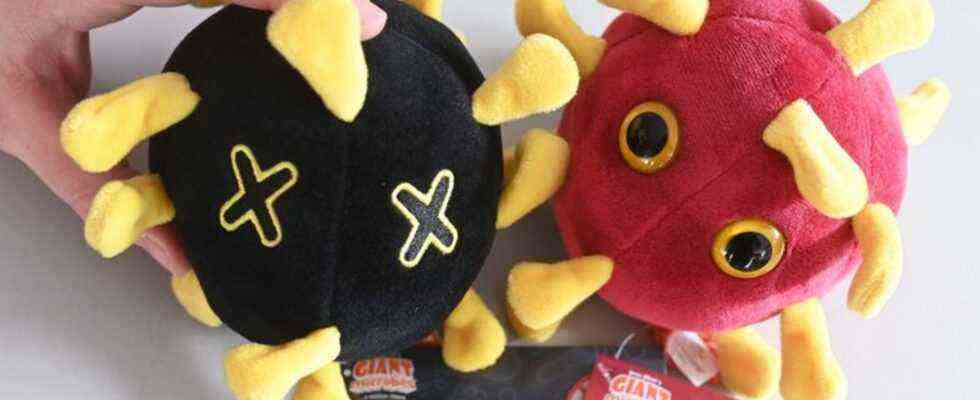toys
Corona in the children’s room – without risk of infection
Plush figures: on the left a dead covid, on the right a covid-19 virus. Photo: Uli Deck/dpa
© dpa-infocom GmbH
Corona has dominated social life for two years. This does not go unnoticed by the little ones. Sometimes corona-specific articles make it into the children’s room.
It’s squishy, has big wide eyes and looks a bit like it’s sticking its tongue out. In this form, the coronavirus loses its terror as a potentially deadly disease. Mutated into a plush version, it can be used as a toy.
It is sold – like the models “Dead Covid”, “Antibodies” and a soft version of the “Covid-19 vaccine” – via the website riesenmikroben.de from Karlsruhe.
The microbes are conceived and designed in the USA, as Tobias Dietrich explains. Inventor Drew Oliver developed the first four – cold, flu, sore throat, stomach ache – in 2003 as visual aids for his children. The Sars-CoV-2 models came with the corona pandemic. The Covid-19 giant microbe is about three times as popular as the most popular non-corona/antibody item, the brain cell. “Overall, sales fluctuate – depending on how strong the topic of “Covid” and “vaccination” is in the public discussion.”
Fluffy mutants
The plush mutant of the virus is one of the few corona-specific items on the market that can probably also be found in children’s rooms. Shortly after the introduction of the mask requirement, some parents tailored mini masks for the offspring at their request, which were also put on when playing in the shop.
“Children imitate the world of adults on a small scale, which is why everyday life during the pandemic is present in the game,” says Steffen Kahnt, Managing Director of the Federal Association of Toy Retailers. But the topic of Corona is more of a niche for the toy industry: “We are not yet seeing games that specifically address biological aspects of the pandemic as a mega trend.”
Nevertheless, some companies have reacted and developed child-friendly products. Tessloff Verlag from Nuremberg, for example, is responsible for the “Was ist was” series and quickly developed a brochure about viruses after the outbreak of the pandemic – free of charge in online and print versions. 70,000 copies of the print edition have now been distributed, according to a publisher’s spokeswoman. There are also more than 4000 downloads. The book “What is what Natural Sciences easy! The viruses and us” was even planned before the pandemic. “We then only slightly adjusted the volume.”
Market for children’s non-fiction books on the rise
According to Media Control, the children’s non-fiction product group increased by 14 percent in the German-speaking region in 2021 compared to 2019, according to the spokeswoman. “Tessloff, as one of the leading publishers in this area, has even gained significantly more sales in percentage terms.” Not only titles on topics such as the body or natural sciences such as biology and chemistry are in demand.
“Interestingly, since the beginning of the pandemic, there has also been an increased demand for classic historical topics such as “Ancient Rome”, “Ancient Greeks” or “Ancient Egypt”,” reports the Tessloff spokeswoman. “In uncertain times, the need for the known is obviously stronger.” In addition, there is probably also a greater need for well-founded, excitingly conveyed factual knowledge because of homeschooling. In any case, the demand for future-oriented volumes fell slightly over the same period.
Nevertheless, Corona does not dominate children’s rooms by far in such infection-free forms. Dietrich in Karlsruhe also says that the giant microbes are only produced in very small quantities compared to the plush items licensed by large manufacturers. He sells them in Germany and since Brexit also in countries that were previously supplied from England, such as Belgium, Denmark, the Netherlands and the Czech Republic.
The Covid microbes would often be bought individually, but also in combination. The most popular are Covid-19 and the vaccine, reports the entrepreneur. And they are not only intended for children, but as a thank you for people who are stressed out by Corona. Apparently, some buyers also send the copies home to sick people: “My customers have the opportunity to have a greeting card included with the shipment free of charge, at the moment there are a lot of “Cheer up, get well soon!” messages.”

